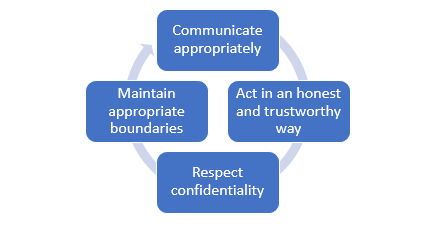Katherine Timms, Head of Policy and Standards, explains how professionals can use social media appropriately
Just over a year ago, we published our new Guidance on social media, to help registrants navigate the complexities of this area. A year on, we are reflecting on how this guidance has helped registrants, and what more we can do to support them.
Social media has some clear benefits to health and care professionals. It helps develop individuals’ skills and knowledge, allows them to network with other professionals, helps the public understand what they do, and raises the profile of their profession.
In using social media, registrants should follow the Standards of conduct, performance and ethics. In particular, they should:

Confidentiality
Confidentiality is an essential consideration in all areas of a professional’s practice, and is particularly important in the context of social media. Our Guidance on confidentiality talks registrants through the principles of confidentiality. We explain that any identifiable information about a service user is confidential. In the workplace this is typically understood to include information such as name, address, treatment, etc. However, identifiable information goes beyond that and can include details about a service user’s personal life, health or circumstances, or images relating to their care.
Where a registrant wishes to share service user information, they should have express consent. The service user must understand and not object to:

For consent to be valid, it must be voluntary and informed, and the person giving consent must have the capacity to make the decision.
Social media in practice
There are many social media platforms available to our registrants. We know that some use WhatsApp groups to help them network with colleagues across hospitals to ensure service user care is the best it can be; checking approaches with supervisors, and considering complex cases in a time effective way. In doing so, registrants should be mindful not to share personal details, and take care to follow employer policies.
A great deal of learning is carried out through Facebook, where colleagues undertaking weekend CPD activities come together to discuss specialist areas of practice, making use of a wider pool of individuals, available at any time. Registrants should be mindful to maintain appropriate professional boundaries and not to post inappropriate material.
LinkedIn can provide excellent networking options and opportunities to write articles and share information, but registrants should think before they post and consider who can see what they share.
Another social media platform our registrants use is Twitter; predominantly to raise the profile of their profession and reach out to the public. Twitter can be a quick and easy way to show people how dedicated and hardworking our registrants are, show the public what they do, and highlight the services they provide.
A key challenge in the use of Twitter is confidentiality. In providing health and care services, HCPC registrants’ primary consideration should be their service user; raising the profile of their profession should only ever be a secondary consideration, and should not impact the service user’s privacy or dignity. When live tweeting in order to raise the profile of the profession, registrants should take care to only share information required to achieve that objective. They should post in a modest manner; only providing the information the public needs to understand the role, and they should ensure any additional information, in particular service user identifiable information, isn’t included.
What next…
After reflecting on the use of our social media guidance over the past year, and the challenges still faced by HCPC registrants in applying this guidance, we intend to update the document with further advice and support on the topic of confidentiality.


